- Home
- Mark Hodder
Sexton Blake and the Great War
Sexton Blake and the Great War Read online
Published 2020 by Rebellion Publishing Ltd, Riverside House, Osney Mead, Oxford, OX2 0ES, UK
ISBN: 978-1-78618-255-5
Copyright © Rebellion Publishing IP Ltd 2020
Sexton Blake is a registered trademark. All related characters, their distinctive likenesses and related elements featured in this publication are trademarks of Rebellion Publishing IP Ltd.
The right of the author to be identified as the author of this work has been asserted in accordance with the Copyright, Designs and Patents Act 1988.
All rights reserved. No part of this publication may be reproduced, stored in a retrieval system, or transmitted, in any form or by any means, electronic, mechanical, photocopying, recording or otherwise, without the prior permission of the copyright owners.
This is a work of fiction. All the characters and events portrayed in this book are fictional, and any resemblance to real people or incidents is purely coincidental.
Designed & typeset by Rebellion Publishing Ltd
Cover art by Crush Creative
www.rebellion.com
The Sexton Blake Library
ANTHOLOGY I: SEXTON BLAKE
AND THE GREAT WAR
Selected, edited and discussed by Mark Hodder and Sexton Blake
BAKER STREET, LONDON
STEPPING INTO HIS room was like stepping back through time. The decor and furniture were Edwardian, the atmosphere was hazy with blue tobacco smoke, and logs were crackling behind an antique fireguard.
He gestured me into a scuffed leather armchair and settled in the one opposite.
I stretched out my legs to allow my rain-soaked trouser bottoms to dry and I stared at him.
He exactly resembled the portraits by the best of his illustrators, Eric Parker. If you were to merge a photograph of a young George Sanders with one of a young Boris Karloff, you’d get the picture. There was a well-contoured brutality about the face. Handsome, cultured, charismatic, but very, very dangerous. I could well understand how Mademoiselle Yvonne Cartier and all those other remarkable women had fallen under his spell. It was in his eyes, especially. They were a strange, gleaming blueish grey, like quicksilver, and missed nothing. I felt them rapidly assessing every detail of me, leaving me, in less than a minute, with the disconcerting notion that he already knew me better than I knew myself.
Thunder rumbled and rain pattered against the windowpane.
“Cigarette?” he asked, proffering a silver case.
I waved it away. “Those things will kill you.”
He gave a wry smile.
I had, with that comment, acknowledged and accepted the limitations placed on this interview; the questions—specifically those pertaining to his longevity—that I was not permitted to ask.
“Well then,” he said, leaning back and striking a match. “Where would you like to begin?”
Audio recording had been prohibited, so I opened my notepad and clicked my ballpoint. We were going to do this the old-fashioned way. “How about with the author who invented you?”
Again, a slight upward curving of the lips.
He put a hand to a decanter on the table beside him. I nodded. He poured two large measures of brandy and passed one to me.
“Harry Blyth,” he said.
“Or Hal Meredith,” I said. “His pen name.”
“I chose him because he’d done me some small favour.”
“This was back in 1893?” I said, conscious of how absurd it sounded.
He steered around that particular query. “Harry was a jobbing writer. He’d done some newspaper work and had a few yarns published in the penny dreadfuls. I was in with Viscount Northcliffe—”
“Alfred Harmsworth,” I put in. “Chief of Amalgamated Press.”
He grunted an affirmation, drew on his cigarette, and puffed out a cloud of blue smoke. “Harmsworth was keen to jump aboard the Sherlock Holmes bandwagon. Detectives were the big thing. The public was clamouring for more. So I encouraged him to ask Harry to create a new one. Harry came up with Gideon Barr.”
“Who?”
“Exactly. I had to put him right. Paid him a visit. ‘Harry,’ I said to him. ‘My name is not Gideon Barr, my name is Sexton Blake, and this is what you’re going to write.’ Then I outlined my scheme.”
“Which was?”
“Try the brandy,” he said. “It’s really very good.”
I did and it was.
Blake drew on his cigarette again and watched its smoke billow toward the high ceiling.
“Mainly,” he murmured. “I wanted my abilities exaggerated in order to disconcert my enemies.”
“In essence, propaganda.”
“Yes. I made a science of it. I was the first to do so.”
“If you’ll forgive the observation, that first story, which appeared in the Halfpenny Marvel story paper, was pretty dreadful.”
He quirked an eyebrow. “Bluntly said, but I don’t disagree. The early tales were silly melodramas replete with mustachio-twirling villains and utterly implausible coincidences. It was the style of the time. Nevertheless, they were inspired by real cases and they served their purpose.”
I resisted the temptation to gulp at the brandy. I felt nervous but I wanted a clear head.
I said, “Why did Mr Blyth sell the rights to the character to Harmsworth?”
“Because I told him to do so. Even in those early days of my career, I was dealing with too many cases for a single writer to document. Also—” He paused, reached for his glass, took a sip, put it down, and examined the tip of his cigarette. “Also, I was a qualified doctor with a sharp eye. Harry had a weak constitution and pushed himself too hard. I knew he wasn’t going to be around for much longer.”
“He died of typhoid fever in 1898.”
“He did, poor fellow. By that point, Harmsworth was already distributing my case notes to other writers. In their hands, the Blake character gradually gained popularity.”
“But—” I hesitated and cleared my throat. “But why that popularity? I mean, if you’ll forgive the observation, the character was little different to all the other detectives crowding the pages of the story papers.”
He smiled again.
They came to him quickly and easily, those smiles. They were fleeting but warm and authentic.
Another pause, another taste of tobacco, another sip of brandy; a man at ease with himself, in no hurry, commanding and entirely in control.
He said, “The fictional Blake survived for the simple reason that there was a real Blake financing him. As for his lack of distinguishing features, that, I fear, was simply a reflection of the truth. I was still a novice, despite the dramatic nature of my various early adventures. I wasn’t, in those days, fully formed. I was trying things out. Different techniques of detection.”
“Different assistants,” I observed.
“Indeed.”
“Even a trained ape, at one point.”
“The less said about Griff, the better.”
“And then along came Tinker.”
He gave a little snort of amusement. “If you meet him, you’d best employ his proper name. Edward Carter is rather embarrassed by his old moniker. Few of us get away with using it nowadays.”
“I’ll be careful,” I said. “The author W. J. Lomax introduced him into the stories in 1904. Was that actually when you met him?”
“Yes. That year and the following were significant ones. Everything pretty much fell into place. Firstly, I happened upon the Baker Street house, which Mrs Bardell had just opened up to lodgers. It so suited my requirements that I rented it complete and became its sole occupant aside from Tinker and the good lady herself. I was thus able to use a room for consultations, ano
ther as a laboratory, a third as a photographic dark room, and so forth. Secondly, I was given Pedro the bloodhound by a grateful client. A truly extraordinary dog. And thirdly, I began to build a more functional relationship with Scotland Yard thanks to the grudging support of Detective-Inspector Spearing.”
“The house, landlady and dog being added to the stories by William Murray Graydon,” I noted.
“One of the greatest of my earlier authors. A tremendously prolific writer.”
“And Spearing by Norman Goddard. By the way, did he really speak like that? Spearing? Those short, jerky, incomplete sentences?”
“Yes, as a matter of fact, he did. The mannerism developed after he received one too many blows to the head.”
I took another sip of brandy and recalled that a younger Spearing had been the principal protagonist in many “non-Sexton Blake” stories and had seemed quite different in them. Now I had an explanation.
Blake flicked his half-smoked cigarette into the fireplace.
In a contemplative tone, he murmured, “Tinker, Pedro and I getting together changed everything. We were, from the outset, an efficient team.”
“Unquestionably,” I agreed. “And as soon as the trio was complete, the nature of your cases changed. For the next five years or so, you appeared to throw yourself into investigations that involved adopting roles in many different fields of industry. In 1905, for example, there were accounts entitled—” I consulted my notes. “The Warder Detective, The Army Detective, The Railway Detective, The Navy Detective, The Fireman Detective, The Cab Driver Detective, The Mechanic Detective, The Post Office Detective, and The River Police Detective. In 1906, you became the reporter detective, the beefeater, the gamekeeper, the diver, the—”
He raised a hand to stop me. “No need to list them all. It was intentional. To be an efficient criminologist, I required knowledge. I wanted to know what people did and how they did it. Therefore, I made myself an expert in as many fields of endeavour as possible.”
I shook my head in amazement. “This astonishing drive of yours, it’s incredible. Do you attribute it to some particular childhood exp—”
“Off limits!” he snapped.
I stopped and blinked. “I’m—my apologies. I didn’t mean to—”
He waggled his fingers dismissively and adopted a gentler tone. “Let’s not stray beyond the bounds, hey? I believe we’ve reached the point of decision. You stated in your letter that you intend the first collection of my old cases to be drawn from those that occurred in the lead up to, and during, the Great War.”
I uttered a sound of agreement, reached down to my briefcase beside the chair, and pulled from it a plastic binder. “From the perspective of a reader, it feels like that’s when you, at least as a fictional character, really came into your own.”
“Blessed be the authors,” he responded. He took the proffered binder and put it on his lap. “Yarns from the old Union Jack story paper, I presume. Which have you chosen?”
He opened the binder and looked down at the illustrated cover inside.
“Ah,” he said softly. “Ah, yes.”
“It can hardly said to have been well-written,” I observed, “but it’s full of exuberance, which I feel exemplifies the tales of the period.”
THE CASE OF THE NAVAL MANOEUVRES
“WE’RE GOING TO have to talk about political correctness in these stories,” I said. “Times have changed. Ethnic slurs aren’t acceptable. Should I excise them?”
Blake frowned and I detected a hot spark in his eyes, though it was most likely a flash of lightning reflecting from the window.
“The censoring of history is a characteristic of fascism,” he said. “Would it not be preferable to provide context? To mention, perhaps, the truth of empires and how they are maintained?”
I reached for my glass and gulped at the brandy.
For seventy years, Sexton Blake had been an icon of the British Empire—its ambassador to the reading public—and now he wanted me to discuss the truth of what he’d represented?
All right, in for a penny, in for a pound.
I took a breath and said, “Empires invade other countries, exploit their resources, and suppress the native populations. To justify this and to obscure the greed and violence, such expansionism is dressed up as ‘extending civilisation,’ as ‘raising primitives to our exalted level,’ as ‘helping.’ It is loathsome nonsense.”
“Quite so,” he responded. “And back then, when it became apparent that a rival empire, in this case a German one, might emerge, the notion that ‘British is best’ and ‘foreigners can’t be trusted’ became a central theme in popular fiction, perhaps nowhere more so than in the Sexton Blake yarns. The authors were simply being patriotic. Were they able to step outside of their age and regard it with an impartial eye, I daresay the anti-German sentiment would have felt as unpleasant to them as it now does to us.”
I said, “And the role you played in demeaning the subjected and demonising the enemy, how do you feel about that?”
“Steady now,” he admonished. “I didn’t write the stories.”
“Nevertheless, the language attributed to you was remarkably jingoistic at times.”
He gave an almost imperceptible shrug. “We are children of the time in which we are immersed, all borne high—and low—by the zeitgeist. It’s important that our mistakes and misjudgements remain on record. We can measure our progress—or lack thereof—by them.” He sighed. “Our attitude toward foreigners was despicable back then. I don’t deny it. Thank goodness we are more self-aware now.”
“Are we, though?”
“I think we better know that we are being bad when we are being bad.”
I indicated the binder on his lap. “The insults aimed at Germans are perfectly understandable within the context of war. I won’t remove them. However, antisemitism and racism directed at non-whites has not yet, regrettably, been completely relegated to the past. Where I encounter instances of them, I’m going to have to hit select-delete.”
He gave a jerk of his chin. “With my full approval. Perhaps footnotes to mark the excisions? Allow readers the opportunity to see how much or how little political incorrectness there was on a story-by-story, author-by-author basis?”
I nodded my agreement.
THE CASE OF THE NAVAL MANOEUVRES
by Norman Goddard
UNION JACK issue 253 (1908).
THE FIRST CHAPTER
The Kaiser’s Speech—The Base in the North Sea—What did he mean?—Sexton Blake to decide.
“THESE MANOEUVRES—WHAT will they show?” Colonel von Harmann asked in a rather sneering tone of the junior officer who sat next to him.
“Why, many things,” Lieutenant Krantz answered doubtfully. “There is the test of seamanship, the—er—”
“Seamanship!” the colonel growled. “Himmel! What does seamanship count for in a modern sea battle? It would just be hammering away with the great guns, and the one that got the right shot in first would win. A game of chance—like all these affairs of war!”
This conversation was taking place at the mess of the First Regiment of the Kaiser’s Pink Dragoons, and, as usual, the conversation after dinner had turned upon the subject of arms, for your German soldier is a man who makes more than a light study of his profession. He loves it until he believes that nothing could stand against his army and its organisation. And on this particular night there were the coming British naval manoeuvres to discuss, the meeting of more than three hundred war vessels in the North Sea. Not for years had such a huge naval demonstration taken place, scarcely ever before had strict secrecy with regard to them been kept to the extent of not allowing even distinguished spectators aboard the ships while the mimic fighting, the attacking and repelling, was in progress.
It was this secrecy most probably that had attracted to the eyes of all countries to the North Sea. Previously Great Britain, proud in her great naval strength, had not hesitated to make quite public all her man
oeuvres by sea, yet this time—
Other nations, including some who could scarcely be said to love the little island, were asking each other what it meant.
Colonel von Harmann lit a large cigar, and puffed away jerkily. He felt in the mood for argument, and the young lieutenant was likely to prove rather an easy victim.
“And why,” he asked, “has the North Sea been chosen for the scene of this affair?”
Lieutenant Krantz twisted his wineglass between his fingers, and his high German forehead, crowned by bristling hair, puckered thoughtfully. He parted his lips to give an answer, but before he could do so one came right from behind the colonel’s chair
“But I can tell you, friends,” it said. “Britain has just awakened to the fact that it is from the North Sea that she is most open to attack.”
Colonel von Harmann turned sharply, then sprang to his feet, his hand going up to the salute.
“The Kaiser!” someone else ejaculated; and, with a clattering of chairs, every officer was on his feet.
Wilhelm II, Emperor of Germany, flung off his long military cloak, revealing the fact that he was wearing the uniform of a colonel of the regiment; and certainly, with his upturned moustache, and rather grim expression, he looked a soldier to the life.
“Be seated, comrades,” he said quietly. “There is no need for officers to stand to welcome a brother officer.”
In obedience to this permission the officers, who numbered rather more than a score, dropped back into their chairs again, and the Kaiser seated himself beside Colonel von Harmann.
“A cigar, your Highness?” the latter suggested, pushing a box forward.

 The Secret of Abdu El Yezdi
The Secret of Abdu El Yezdi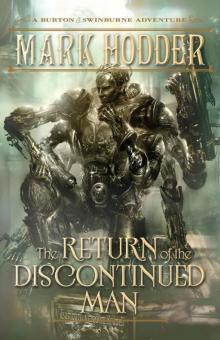 The Return of the Discontinued Man
The Return of the Discontinued Man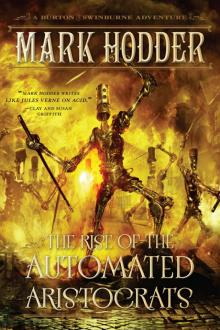 The Rise of the Automated Aristocrats
The Rise of the Automated Aristocrats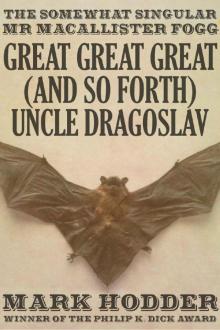 Macallister Fogg 2: Great Great Great (And So Forth) Uncle Dragoslav
Macallister Fogg 2: Great Great Great (And So Forth) Uncle Dragoslav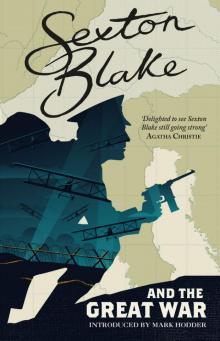 Sexton Blake and the Great War
Sexton Blake and the Great War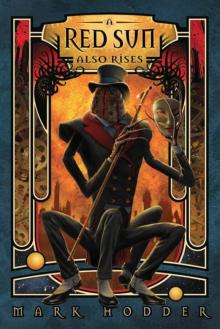 A Red Sun Also Rises
A Red Sun Also Rises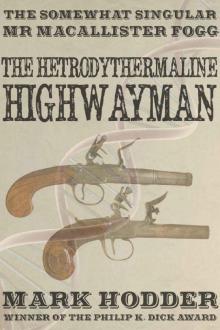 Macallister Fogg 3: The Hetrodythermaline Highwayman
Macallister Fogg 3: The Hetrodythermaline Highwayman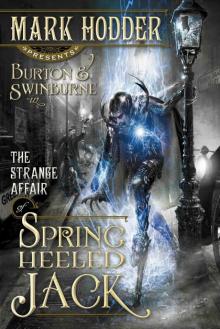 The Strange Affair of Spring Heeled Jack
The Strange Affair of Spring Heeled Jack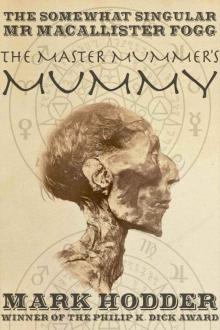 Macallister Fogg 1: The Master Mummer's Mummy (The Adventures of Macallister Fogg)
Macallister Fogg 1: The Master Mummer's Mummy (The Adventures of Macallister Fogg)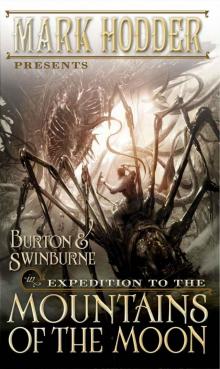 Expedition to the Mountains of the Moon bas-3
Expedition to the Mountains of the Moon bas-3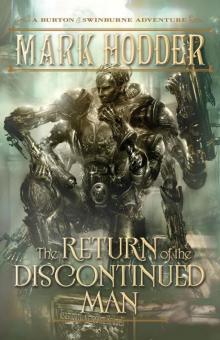 The Return of the Discontinued Man (A Burton & Swinburne Adventure)
The Return of the Discontinued Man (A Burton & Swinburne Adventure)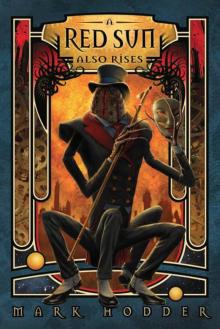 Red Sun Also Rises, A
Red Sun Also Rises, A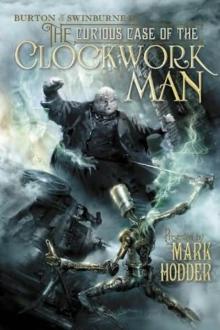 The curious case of the Clockwork Man bas-2
The curious case of the Clockwork Man bas-2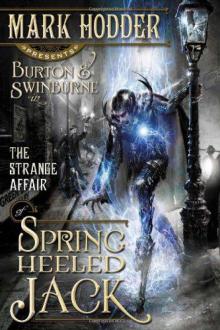 The strange affair of Spring-heeled Jack bas-1
The strange affair of Spring-heeled Jack bas-1